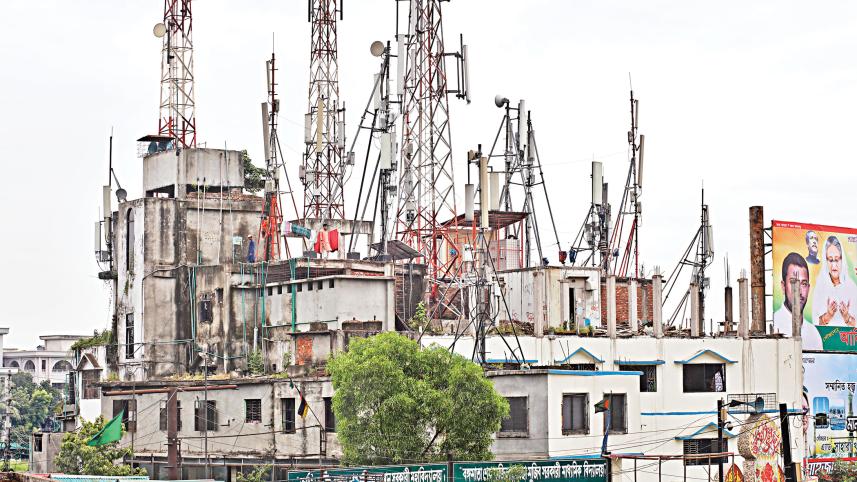BTRC prepares for next spectrum auction by Jan

- BTRC prepares 700 MHz spectrum auction
- Court dispute may limit available bandwidth
- Operators demand full band, lower prices
- High spectrum costs risk slowing rollout
With the last auction held nearly three years ago, the telecom regulator is now preparing to sell spectrum in the 700 MHz band, a key resource for strengthening 4G and expanding 5G coverage nationwide.
In the upcoming auction, only about half the available capacity may be put on sale because of an ongoing legal dispute now pending with the Supreme Court.
Mobile operators, however, are demanding that the entire band be auctioned together, saying smaller allocations raise costs, reduce efficiency and weaken service quality.
The Bangladesh Telecommunication Regulatory Commission (BTRC) has said that if the dispute is resolved before the auction, the full spectrum will be offered. Otherwise, only half will go under the hammer.
The regulator has already sought approval from the posts and telecommunications ministry to proceed. In a recent letter, the BTRC informed the ministry that preparations are complete.
BTRC Chairman Maj Gen (retd) Md Emdad ul Bari said that if approval arrives by early November, the auction could take place by January.
"We have already sent a letter to the ministry to hold an auction with the available 25 MHz. The rest can be added if it becomes available before the auction takes place," he told The Daily Star.
Spectrum refers to the range of radio frequencies that carry mobile voice and data signals. Lower frequencies travel farther and penetrate buildings better, while higher ones carry more data but over shorter distances.
In Bangladesh, 45 MHz within the 703 to 803 MHz range is reserved for mobile use. The rest of the band is allocated to broadcasting services and state agencies.
The 700 MHz band is especially prized for its broad coverage and stable connectivity, making it very important for bridging the digital divide and expanding affordable broadband access.
The draft auction guidelines give the BTRC the option to sell either the currently available 25 MHz or the full 45 MHz, depending on whether the court case involving a broadband provider is resolved before the auction.
Back in 2007, the BTRC allocated 12 MHz from the 700 MHz band to the broadband provider Always On Network Bangladesh Ltd.
At the time, the band had not yet been recognised locally for mobile use, though it was later assigned globally for telecom services. The commission later said the allocation was made in error and offered replacement spectrum in the 5 GHz band.
But the company challenged the BTRC cancellation in the High Court, which issued a ruling that is now under appeal before the Appellate Division. Until the appeal is resolved, the 12 MHz thus remains unavailable.
Officials said the hearing date is yet to be confirmed, as the Supreme Court is currently on vacation until mid-October.
According to them, if the appeal is settled before the auction, the BTRC will offer the full 45 MHz. Otherwise, it will go ahead with 25 MHz.
OPERATORS PUSH FOR FULL AUCTION AND LOWER RATES
In March, Telenor, Axiata and VEON, the foreign investors in Grameenphone, Robi and Banglalink, submitted letters to the telecom ministry asking for the release of the entire 45 MHz at once.
They say that larger, contiguous blocks are essential for efficient 5G rollout. Fragmented or smaller allocations, they say, increase costs, reduce efficiency and limit network performance.
Shahed Alam, chief corporate and regulatory officer at Robi Axiata PLC, said selling only part of the spectrum could hurt market competition.
"Rushing to sell fragments without first resolving the remaining 20 MHz sends a negative signal to ongoing litigations and undermines investor confidence," he said.
Alam added that low-band spectrum like 700 MHz is too valuable to be sold in pieces. Fragmented sales, according to him, could lead to slower rural coverage, higher prices for users and weaker digital inclusion.
Meanwhile, spectrum pricing remains another flashpoint. The BTRC initially proposed a base price of Tk 263 crore per MHz, but operators and foreign investors have called for a reduction.
They say excessive spectrum costs could slow their network expansion and upgrades.
Taimur Rahman, chief corporate and regulatory affairs officer of Banglalink, said spectrum prices in Bangladesh are very high compared with countries of similar size and demographics.
He referred to a recent GSMA study that highlighted how lower spectrum prices could accelerate digital adoption nationwide.
In May, Special Assistant to the Chief Adviser Faiz Ahmad Taiyeb recommended a 10 percent cut in the reserve price, according to commission documents.
Acknowledging the sensitivity of the issue, the BTRC said the final price should be determined through consultation with the finance and telecom ministries.
Rahman said they hope the government would consider the GSMA study and its call for lower spectrum costs.
"The 700 MHz band is globally recognised as the digital dividend band and should therefore be priced significantly lower than other bands to maximise its impact on ensuring digital penetration across the country," he added.



 For all latest news, follow The Daily Star's Google News channel.
For all latest news, follow The Daily Star's Google News channel.
Comments